| کد مقاله | کد نشریه | سال انتشار | مقاله انگلیسی | نسخه تمام متن |
|---|---|---|---|---|
| 10437694 | 912326 | 2014 | 17 صفحه PDF | دانلود رایگان |
عنوان انگلیسی مقاله ISI
Pro-social preferences and self-selection into jobs: Evidence from South African nurses
ترجمه فارسی عنوان
اولویتهای طرفدار اجتماعی و انتخاب خود به مشاغل: شواهد از پرستاران آفریقای جنوبی
دانلود مقاله + سفارش ترجمه
دانلود مقاله ISI انگلیسی
رایگان برای ایرانیان
کلمات کلیدی
ترجمه چکیده
اگرچه بخش وسیعی از کارهای اقتصادی به نقش انگیزه های طرفدار اجتماعی برای توضیح انتخاب خود به مشاغل دولتی یا غیرانتفاعی، به ویژه در تحویل خدمات اجتماعی توجه می کند، توجه به نقش از ترجیحات طرفدار اجتماعی در تصمیم گرفتن پست در مناطق روستایی و جدا شده. با این حال، دلایل بر این باورند که چنین انتخاب هایی شامل میزان خودکفایی هستند، به ویژه در کشورهای در حال توسعه که مناطق روستایی معمولا محیط زیست جغرافیایی، سطح بالایی از فقر، فرصت های تحصیلی کم، دسترسی محدود به خدمات اساسی و فرصت های شغلی بدتری را ترکیب می کنند. از طرف دیگر، به دلیل کمبود کارکنان واجد شرایط در مناطق روستایی بالاتر، بازدهی در حضور کارکنان بهداشتی و منافع مردم به احتمال زیاد بالاتر خواهد بود. با استفاده از داده های حاصل از مطالعه طولی پرستاران در آفریقای جنوبی، این مقاله این فرضیه را با پیوند سنجی تجربی از ترجیحات حرفه ای اجتماعی و نتیجه گیری های ترجیحات نشان می دهد. سه اندازه گیری ترجیحات طرفدار اجتماعی بر اساس کمک های انجام شده توسط شرکت کنندگان در مطالعه در بازی دیکتاتور بازی شده در ابتدای ساخت ساخته شده است. انتخاب های شغلی سه سال بعد برای بیش از 97٪ نمونه اولیه انجام می شود. ما نشان می دهیم که پرستاران بیشتر به پرستاران اختصاص داده می شوند - با توجه به سخاوت آنها نسبت به بیماران در بازی دیکتاتور، بیشتر احتمال دارد آنها یک کار روستایی را انتخاب کنند. این نتیجه محکم است تا شامل انواع کنترل های جمعیت شناختی و مشخصات مختلف اقتصادسنجی شود. این یافته در ادبیات نقش ارزش های طرفدار اجتماعی به عنوان عامل انگیزه ذاتی در تصمیم گیری در مورد عرضه کار کمک می کند و پیامدهای سیاست گذاری برای ارائه خدمات اجتماعی در شرایط دشوار است.
موضوعات مرتبط
علوم انسانی و اجتماعی
اقتصاد، اقتصادسنجی و امور مالی
اقتصاد و اقتصادسنجی
چکیده انگلیسی
Although a growing body of economic work has looked at the role of pro-social motives to explain self-selection into public or not-for-profit sector jobs, in particular in the delivery of social services, no attention has been given to the role of pro-social preferences in the decision to take up posts in rural and isolated areas. Yet there are reasons to believe that such choices involve a degree of self-sacrifice, in particular in developing countries where rural regions typically combine geographic hostile environment, high levels of poverty, low educational opportunities, limited access to basic services and worse career opportunities. On the other hand, as shortage of qualified staff is higher in rural areas, the returns on the presence of a health worker, and the benefits to the populations, are likely to be higher. Using data from a longitudinal study of nurses in South Africa this paper tests this hypothesis by linking experimental measure of pro-social preferences and revealed preferences outcomes. Three measures of pro-social preferences are constructed based on donations made by study participants in a dictator game played at baseline. Job choices are observed three years later for more than 97% of the initial sample. We show that the more dedicated the nurses - measured by their generosity towards patients in the dictator game - the more likely they are to have chosen a rural job. This result is robust to the inclusion of various demographic controls and to different econometric specifications. This finding contributes to the literature on role of pro-social values as an intrinsic motivation factor in labour supply decisions and it has policy implications for the provision of social services in difficult settings.
ناشر
Database: Elsevier - ScienceDirect (ساینس دایرکت)
Journal: Journal of Economic Behavior & Organization - Volume 107, Part A, November 2014, Pages 136-152
Journal: Journal of Economic Behavior & Organization - Volume 107, Part A, November 2014, Pages 136-152
نویسندگان
Mylene Lagarde, Duane Blaauw,
